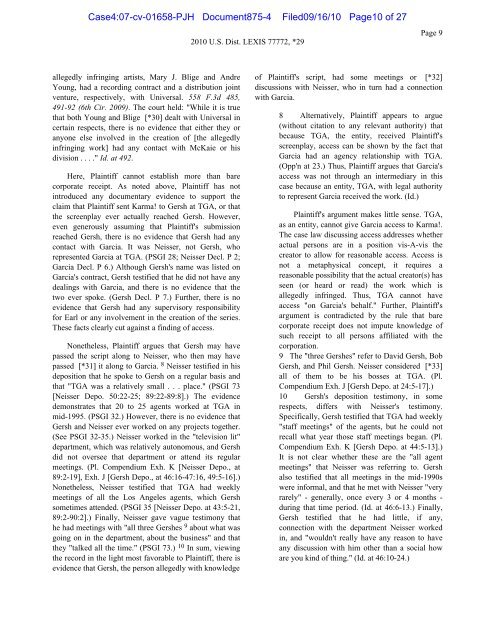exhibit 2 - SAP Lawsuit Portal
exhibit 2 - SAP Lawsuit Portal
exhibit 2 - SAP Lawsuit Portal
You also want an ePaper? Increase the reach of your titles
YUMPU automatically turns print PDFs into web optimized ePapers that Google loves.
Case4:07-cv-01658-PJH Document875-4 Filed09/16/10 Page10 of 27<br />
allegedly infringing artists, Mary J. Blige and Andre<br />
Young, had a recording contract and a distribution joint<br />
venture, respectively, with Universal. 558 F.3d 485,<br />
491-92 (6th Cir. 2009). The court held: "While it is true<br />
that both Young and Blige [*30] dealt with Universal in<br />
certain respects, there is no evidence that either they or<br />
anyone else involved in the creation of [the allegedly<br />
infringing work] had any contact with McKaie or his<br />
division . . . ." Id. at 492.<br />
Here, Plaintiff cannot establish more than bare<br />
corporate receipt. As noted above, Plaintiff has not<br />
introduced any documentary evidence to support the<br />
claim that Plaintiff sent Karma! to Gersh at TGA, or that<br />
the screenplay ever actually reached Gersh. However,<br />
even generously assuming that Plaintiff's submission<br />
reached Gersh, there is no evidence that Gersh had any<br />
contact with Garcia. It was Neisser, not Gersh, who<br />
represented Garcia at TGA. (PSGI 28; Neisser Decl. P 2;<br />
Garcia Decl. P 6.) Although Gersh's name was listed on<br />
Garcia's contract, Gersh testified that he did not have any<br />
dealings with Garcia, and there is no evidence that the<br />
two ever spoke. (Gersh Decl. P 7.) Further, there is no<br />
evidence that Gersh had any supervisory responsibility<br />
for Earl or any involvement in the creation of the series.<br />
These facts clearly cut against a finding of access.<br />
Nonetheless, Plaintiff argues that Gersh may have<br />
passed the script along to Neisser, who then may have<br />
passed [*31] it along to Garcia. 8 Neisser testified in his<br />
deposition that he spoke to Gersh on a regular basis and<br />
that "TGA was a relatively small . . . place." (PSGI 73<br />
[Neisser Depo. 50:22-25; 89:22-89:8].) The evidence<br />
demonstrates that 20 to 25 agents worked at TGA in<br />
mid-1995. (PSGI 32.) However, there is no evidence that<br />
Gersh and Neisser ever worked on any projects together.<br />
(See PSGI 32-35.) Neisser worked in the "television lit"<br />
department, which was relatively autonomous, and Gersh<br />
did not oversee that department or attend its regular<br />
meetings. (Pl. Compendium Exh. K [Neisser Depo., at<br />
89:2-19], Exh. J [Gersh Depo., at 46:16-47:16, 49:5-16].)<br />
Nonetheless, Neisser testified that TGA had weekly<br />
meetings of all the Los Angeles agents, which Gersh<br />
sometimes attended. (PSGI 35 [Neisser Depo. at 43:5-21,<br />
89:2-90:2].) Finally, Neisser gave vague testimony that<br />
he had meetings with "all three Gershes 9 about what was<br />
going on in the department, about the business" and that<br />
they "talked all the time." (PSGI 73.) 10 In sum, viewing<br />
the record in the light most favorable to Plaintiff, there is<br />
evidence that Gersh, the person allegedly with knowledge<br />
2010 U.S. Dist. LEXIS 77772, *29<br />
Page 9<br />
of Plaintiff's script, had some meetings or [*32]<br />
discussions with Neisser, who in turn had a connection<br />
with Garcia.<br />
8 Alternatively, Plaintiff appears to argue<br />
(without citation to any relevant authority) that<br />
because TGA, the entity, received Plaintiff's<br />
screenplay, access can be shown by the fact that<br />
Garcia had an agency relationship with TGA.<br />
(Opp'n at 23.) Thus, Plaintiff argues that Garcia's<br />
access was not through an intermediary in this<br />
case because an entity, TGA, with legal authority<br />
to represent Garcia received the work. (Id.)<br />
Plaintiff's argument makes little sense. TGA,<br />
as an entity, cannot give Garcia access to Karma!.<br />
The case law discussing access addresses whether<br />
actual persons are in a position vis-A-vis the<br />
creator to allow for reasonable access. Access is<br />
not a metaphysical concept, it requires a<br />
reasonable possibility that the actual creator(s) has<br />
seen (or heard or read) the work which is<br />
allegedly infringed. Thus, TGA cannot have<br />
access "on Garcia's behalf." Further, Plaintiff's<br />
argument is contradicted by the rule that bare<br />
corporate receipt does not impute knowledge of<br />
such receipt to all persons affiliated with the<br />
corporation.<br />
9 The "three Gershes" refer to David Gersh, Bob<br />
Gersh, and Phil Gersh. Neisser considered [*33]<br />
all of them to be his bosses at TGA. (Pl.<br />
Compendium Exh. J [Gersh Depo. at 24:5-17].)<br />
10 Gersh's deposition testimony, in some<br />
respects, differs with Neisser's testimony.<br />
Specifically, Gersh testified that TGA had weekly<br />
"staff meetings" of the agents, but he could not<br />
recall what year those staff meetings began. (Pl.<br />
Compendium Exh. K [Gersh Depo. at 44:5-13].)<br />
It is not clear whether these are the "all agent<br />
meetings" that Neisser was referring to. Gersh<br />
also testified that all meetings in the mid-1990s<br />
were informal, and that he met with Neisser "very<br />
rarely" - generally, once every 3 or 4 months -<br />
during that time period. (Id. at 46:6-13.) Finally,<br />
Gersh testified that he had little, if any,<br />
connection with the department Neisser worked<br />
in, and "wouldn't really have any reason to have<br />
any discussion with him other than a social how<br />
are you kind of thing." (Id. at 46:10-24.)


